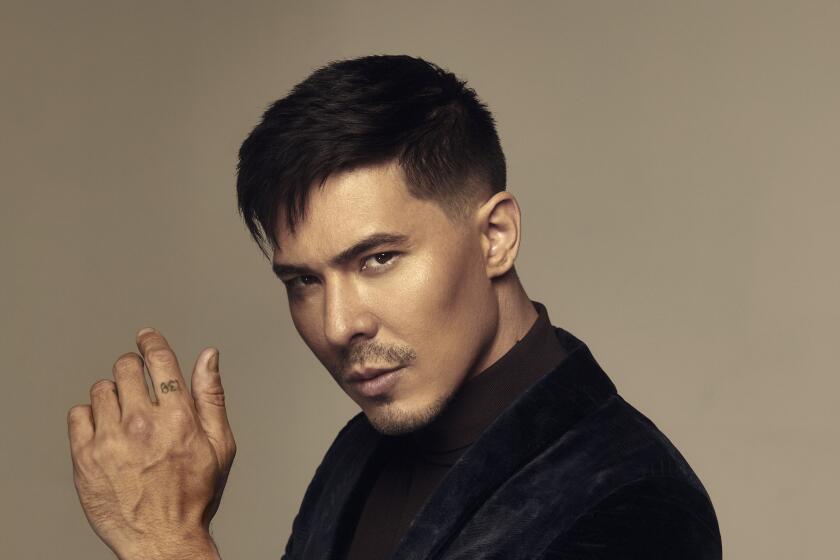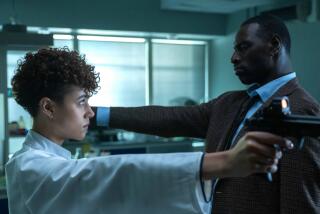āMortal Kombatāsā Joe Taslim reveals hidden talents and his dream director wish list
If youāve seen Joe Taslimās punishing moves in action hits like āThe Raidā and āFast & Furious 6,ā you can picture him handily wreaking havoc in Warner Bros.ā R-rated āMortal Kombatā as Sub-Zero, the video game assassin famous for eviscerating his enemies in gory fashion. But even action superfans might not guess that between filming intense fights and those brutal fatalities on set in Australia, the Indonesian actor and martial artist could be found in his hotel room playing guitar covers of ā90s R&B love songs by Babyface, Toni Braxton and Brian McKnight.
āāRibbon in the Skyā is my favorite song of Steve Wonderās,ā said Taslim over videochat from Jakarta, Indonesia, revealing his musical passion with a smile. āBut Iām shy. I like to sing by myself at, like, midnight.ā
After breaking out internationally in the 2011 Indonesian hit āThe Raid,ā Taslim quickly established himself as one of the top action stars of his generation, scoring studio gigs in āThe Fast Sagaā and āStar Trek Beyondā for director Justin Lin, wielding a blade in the South Korean film āThe Swordsmanā and facing off against āRaidā co-star Iko Uwais in Timo Tjahjantoās gory crime movie āThe Night Comes for Us.ā
Taslim, 39, has also starred for two seasons and counting as the enforcer Li Yong in Cinemaxās martial arts-fueled period drama āWarrior,ā based on the writings of Bruce Lee. (A just-announced third season will relocate the series to HBO Max, where āMortal Kombatā gave the streamer its biggest premiere draw yet.) But while heās simultaneously found more versatile acting roles back home, Western audiences have yet to see all he can do.
It was just over a decade ago that Taslim hit āsendā on the message that changed his life. In his late 20s, the national judo champ had finally retired from competitive sports to pursue his lifelong acting dream, inspired by stars like Chuck Norris, Alain Delon and Bruce Lee, whose films had filled him with wonder as a boy. Heād landed only a few roles before he caught an action film, āMerantau,ā that took his breath away. After finding the filmmaker on social media, he made a Hail Mary via Facebook: āGive me one chance to audition,ā he wrote. āIf you donāt like me, just kick me out of the room.ā
To Taslimās surprise, Gareth Evans wrote back in minutes. He was, in fact, making his next movie and invited the self-described ājudo guyā to try out. āSerbuan maut (The Raid)ā would become a groundbreaking showcase for silat, a martial art Taslim wasnāt trained in, but he was a quick study. His performance as a sergeant leading his squad through a relentless ambush, opposite co-stars and fight choreographers Uwais and Yayan Ruhian, would propel all three, plus Evans, into action history.
āThat was the start of my career,ā Taslim said, grinning. Now, in āMortal Kombat,ā he breathes frosty life into the lethal assassin Sub-Zero ā a character he came to view as a tragic figure, not merely a villainous cryomancer with a penchant for centuries-long vendettas and crafting makeshift daggers out of his enemiesā frozen blood.
And once again, heās ready to manifest his next breakthrough role. āI love āPhantom Thread,ā by Paul Thomas Anderson,ā said Taslim. PTA, are you reading this?
Was it an easy decision to say yes to playing Sub-Zero in a new āMortal Kombatā movie?
Honestly, it was not hard. Iām quite a nerd. Iām a gamer. Little Joe inside was like, āEeeee!ā But of course, I needed to read the script. Because I watched the two previous āMortal Kombatā movies and [I wanted to know] if they wanted to go in that direction, or they wanted to go more serious. While theyāre both amazing, if they wanted me to be part of it, Iād want to give more. So I read the script and I really liked the beginning of the movie. In the first 10 pages of the story of what started the rivalry between Sub-Zero [and Scorpion] hooked me straight away. I thought, OK, I donāt need to read more. This is a definite yes.
Also, I asked my son for his opinion and he said, āAll my friends say you look like Sub-Zero. You should play Sub-Zero.ā Heās 10. I said you canāt play the game, itās too violent! But somehow behind my back, I donāt know ā¦ heās a kid. [Laughs]
If you want an honest opinion, ask a 10-year-old. It can be a challenge to bring details to a character who spends most of the movie wearing a mask. We meet him first as Bi-Han, the person he was centuries ago, which humanizes Sub-Zero in a surprising way. Why was it important to show us both Bi-Han and Sub-Zero?
I researched a lot. I wanted to do justice to the character but I didnāt want to betray the fans, so I used all the materials I got from the internet, the producers and the writers. I had information about him before heās Sub-Zero and after he transforms into another character.
Heās just such a sad character, Iāve got to say. Even though heās the main villain of the movie ā¦ at the same time, if you look back, he was abducted as a kid. It was not his choice to be an assassin. The Lin Kuei attacked [his] family, killed the parents, abducted him and his brother, indoctrinated him to be an assassin ā thatās sad. I told [director] Simon [McQuoid] that I wanted to use pain as the seed for me to play this character. Whatever I do in front of the camera, I want you to know that itās not actually evil, itās pain.
Thereās a moment when, during their opening face-off in feudal Japan, Bi-Han speaks first in Chinese and then Japanese as he confronts his nemesis Hanzo (Hiroyuki Sanada). Itās an intriguing linguistic moment; what did that aspect of the character mean to you?
There was an option to do it in English, but me and Hiroyuki [Sanada] and the director thought that we needed to do it right. Itās feudal Japan, and if you want to be honest to play this character and give it truth, we need to speak our own languages. For Bi-Han to be bilingual, or maybe more, is in my research as well, because the Lin Kuei organization is not old-fashioned. Itās actually high tech and full of resources. When they train assassins they donāt train them just in martial arts, they educate and probably teach them three or four languages because in order to be good assassins you canāt just have muscles, you have to have the brains. So for Bi-Han, I believed as part of my character that I needed to be able to speak at least three or four.
Heās just such a sad character... I wanted to use pain as the seed for me to play this character.
— Joe Taslim on āMortal Kombatā villain Sub-Zero
How did you get that dialogue right?
[Castmate] Ludi [Lin] taught me a lot about how to pronounce Mandarin. I speak very basic because in Indonesia, my mom when I was a kid used to speak Mandarin to me. I have this memory of the Mandarin language and a familiarity with the language. But to be able to perform the language right, I had a teacher from Beijing, research on how to pronounce it right, and Ludi helped me a lot. āLudi, Ludi, come here, letās practice!ā Then the Japanese language, Hiroyuki taught me on set.
Thatās one way it can pay to have a multicultural cast in your movie.
Iām very fortunate that in the process of shooting everybody was together, one family, and tried to shine themselves but at the same time you want to shine your co-actors. It was collaborative, beautifully diverse and it felt like family.
On set many of the actors performed their own stunts. Is there such a thing as finding action chemistry within a cast?
Trust is No. 1 and then youāve got to always match the pace of your partner, because itās like dancing ā¦ in a violent way! A violent dance. Thatās why itās so artistic. You canāt be too fast, or too slow. Youāve got to find the pace that you can both dance to together. Rather than, āIām going to do this really fast so you canāt keep up with me,ā or āIām going to do it really slow so you look bad.ā Thereās an ego in actors, most actors, that want to look more badass than the other, and thatās the hard part of doing a good fight scene.
In a time of anti-Asian hate and after years fighting for a place in Hollywood, āMortal Kombatāsā Lewis Tan finds a rarity: a majority nonwhite cast.
Itās about being brothers first. They have to trust me, because the last thing that I want to do is to hurt you and I know that the last thing you want to do on this project is to hurt me. Trust is the key, and then to dance, and then go all out and find the pace that you can both dance to. Itās about both of you dancing together in that music.
You mentioned that your mom spoke some Mandarin during your childhood. How would you describe your background?
Iām Chinese Indonesian, and Iām proud to be Chinese-born in Indonesia. Of course, Iām a double minority here in Indonesia because Iām not Malay and Iām not Muslim. It was hard to be a double minority in this country, and I grew up with all these energies against me. But youāve got to be proud of who you are, because thatās your identity. I see myself as an Indonesian citizen of Chinese descent, and for me to represent the country, the biggest Muslim population in the world and have Chinese blood ā to be Asian now in Hollywood ā I can probably give a little bit of energy to people in Southeast Asia especially, [to show] that everything is possible.
Iām so lucky to have this career, to represent, and to inspire people. Because I remember when I was a kid I watched Dustin Nguyen and Bruce Lee, and to see Asians in Hollywood made me believe that if they could do it, I could do it. So itās not just fantasy. Youāve got to be real and be proud of your identity because itās who you are, no matter how hard it could be. Especially now. Now is hard.
Now is a time when stateside weāre seeing an increase in instances of anti-Asian racism and hate. Did it feel significant to you that Sub-Zero is being played by someone of Asian descent when that hasnāt always been the case in this franchise?
Iām proud and Iām so happy. I respect Simon [McQuoid] for believing in that as well. I think to whitewash a character is an insult, that you think they donāt deserve, or they donāt have the talent. And now I think Hollywood is more open.
Some may see a skilled action star and assume theyāre good at their job because of a martial arts background, but your martial arts background is primarily in judo, a form not commonly seen in the action genre.
For me, martial arts is like music. Probably people will disagree with that. I spent 15 years in judo where we donāt punch, kick or do all the stuff that you see in the movie. We wrestle. I believe, like in music, when youāre good in one instrument and you understand the core of the rhythm, the music, once you jump to another, the case is different but whatās inside is the same.
You made a movie in Indonesia a few years ago called āHit & Run,ā an action comedy in which you also play a romantic lead. Do those kinds of opportunities allow you to stretch more as an actor? And are they the kinds of roles youād like to do more of?
As an actor I donāt want to limit myself. I think in order to become a better actor you have to take risks and then do something opposite ā do something that youāre not comfortable with. Thatās the only way to grow. So I did it! Iām very fortunate that in Hollywood the industry puts me in a box as a very strong, violent, dangerous villain or antihero character, every time they offer me something. But in Asia I have so much freedom to do the opposite.
My dream is not to be a superstar in terms of superstars who have a lot of rules, where your managerās going to say, āDonāt do that,ā āDonāt do this,ā because your image is of a tough, masculine manā¦ I want to be an actor, and acting is a profession that explores a lot of emotion and characters. The only way for me to grow as an actor is to do crazy stuff, not only play one specific genre. So Iām happy because in Indonesia I can do whatever I want, and in Hollywood people believe that I can pull this specific strong, alpha male, vicious villain kind of character. I live in both worlds, and Iām grateful, because I know for a lot of my friends in Hollywood itās very hard for them to cross genres.
What is a dream role youād like to try outside of action?
This is probably quite obvious: non-action stuff. I want to get out of the comfort zone. I like stories about family. I like dramas ā¦ like āMinari.ā And I love āPhantom Thread,ā by Paul Thomas Anderson. Thatās my favorite movie in decades. I love that movie so much. I want to work with Paul Thomas Anderson and Bong Joon Ho. Iāll do anything! I know both of them probably think Iām an action guy, but the way I told Gareth to give me a chance ā if you donāt like me, just kick me out of the room.
More to Read
Only good movies
Get the Indie Focus newsletter, Mark Olsen's weekly guide to the world of cinema.
You may occasionally receive promotional content from the Los Angeles Times.












